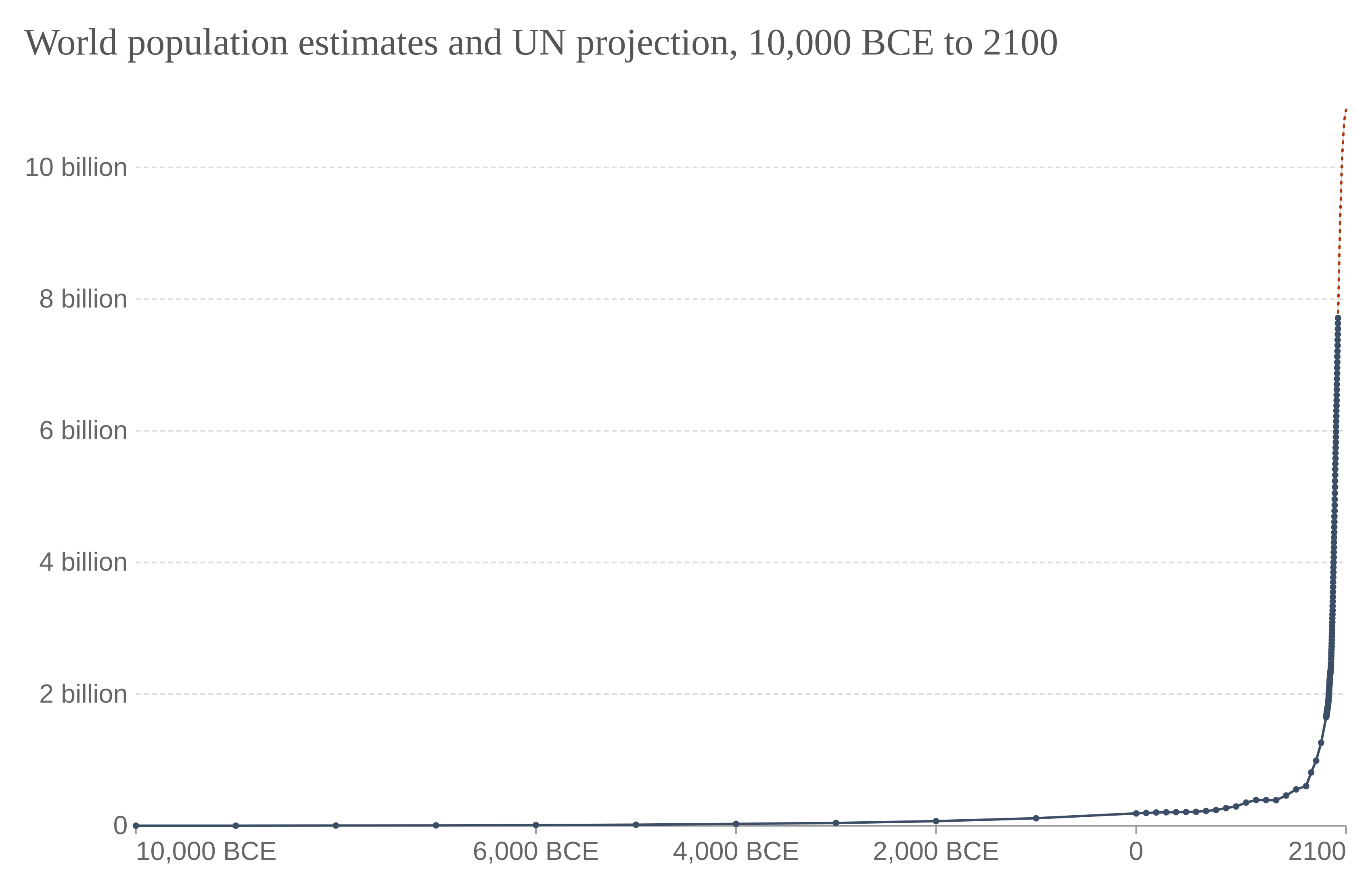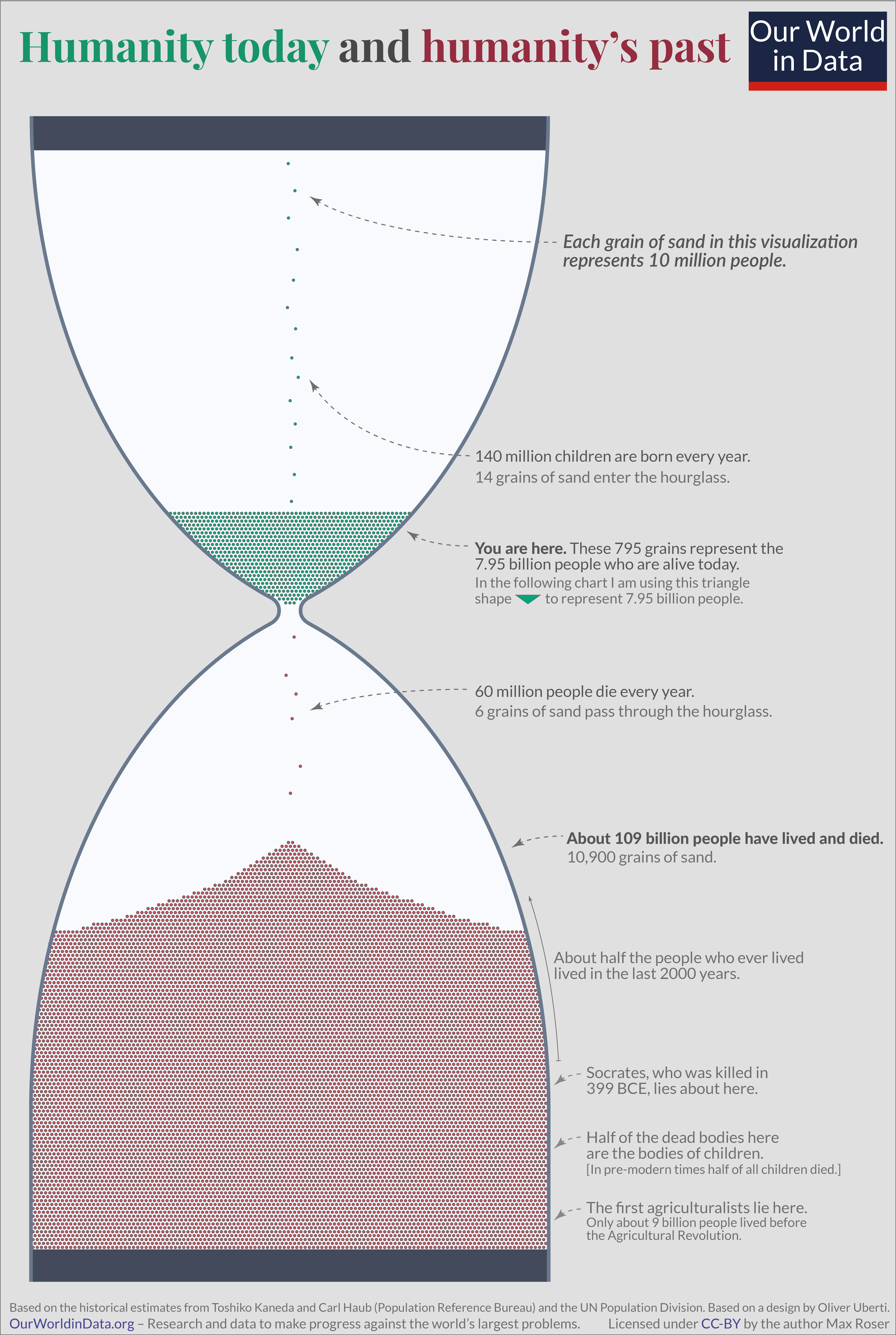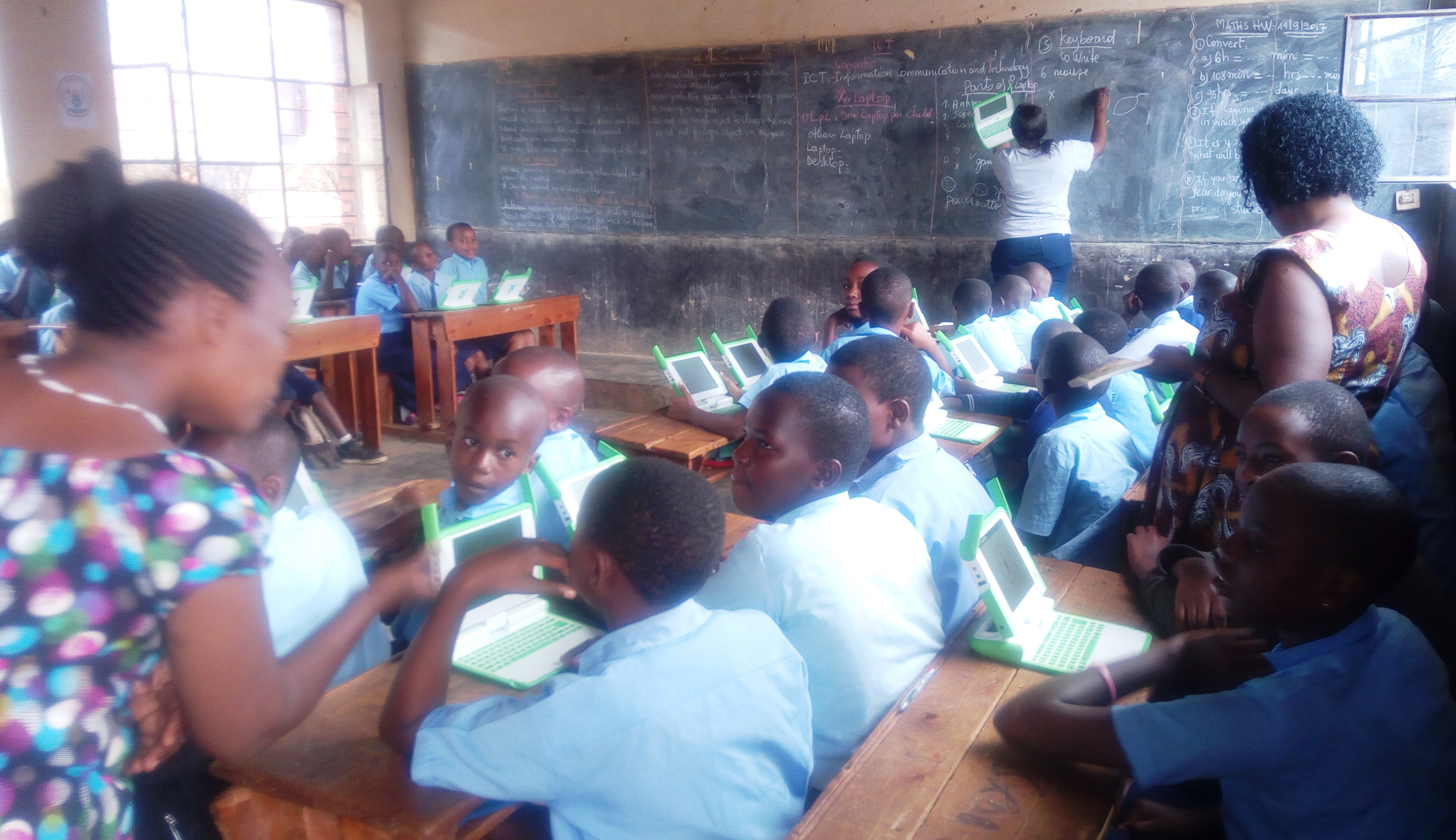|
20th-century
The 20th (twentieth) century began on January 1, 1901 ( MCMI), and ended on December 31, 2000 ( MM). The 20th century was dominated by significant events that defined the modern era: Spanish flu pandemic, World War I and World War II, nuclear weapons, nuclear power and space exploration, nationalism and decolonization, technological advances, and the Cold War and post-Cold War conflicts. These reshaped the political and social structure of the globe. The 20th century saw a massive transformation of humanity's relationship with the natural world. Global population, sea level rise, and ecological collapses increased while competition for land and dwindling resources accelerated deforestation, water depletion, and the mass extinction of many of the world's species and decline in the population of others. Global heating increased the risk of extreme weather conditions. Additional themes include intergovernmental organizations and cultural homogenization through developments in ... [...More Info...] [...Related Items...] OR: [Wikipedia] [Google] [Baidu] |
Cold War
The Cold War is a term commonly used to refer to a period of geopolitical tension between the United States and the Soviet Union and their respective allies, the Western Bloc and the Eastern Bloc. The term '' cold war'' is used because there was no large-scale fighting directly between the two superpowers, but they each supported major regional conflicts known as proxy wars. The conflict was based around the ideological and geopolitical struggle for global influence by these two superpowers, following their temporary alliance and victory against Nazi Germany and Imperial Japan in 1945. Aside from the nuclear arsenal development and conventional military deployment, the struggle for dominance was expressed via indirect means such as psychological warfare, propaganda campaigns, espionage, far-reaching embargoes, rivalry at sports events, and technological competitions such as the Space Race. The Western Bloc was led by the United States as well as a number of othe ... [...More Info...] [...Related Items...] OR: [Wikipedia] [Google] [Baidu] |
Spanish Flu
The 1918–1920 influenza pandemic, commonly known by the misnomer Spanish flu or as the Great Influenza epidemic, was an exceptionally deadly global influenza pandemic caused by the H1N1 influenza A virus. The earliest documented case was March 1918 in Kansas, United States, with further cases recorded in France, Germany and the United Kingdom in April. Two years later, nearly a third of the global population, or an estimated 500 million people, had been infected in four successive waves. Estimates of deaths range from 17 million to 50 million, and possibly as high as 100 million, making it one of the deadliest pandemics in history. The pandemic broke out near the end of World War I, when wartime censors suppressed bad news in the belligerent countries to maintain morale, but newspapers freely reported the outbreak in neutral Spain, creating a false impression of Spain as the epicenter and leading to the "Spanish flu" misnomer. Limited historical epidemiologic ... [...More Info...] [...Related Items...] OR: [Wikipedia] [Google] [Baidu] |
Deforestation
Deforestation or forest clearance is the removal of a forest or stand of trees from land that is then converted to non-forest use. Deforestation can involve conversion of forest land to farms, ranches, or urban use. The most concentrated deforestation occurs in tropical rainforests. About 31% of Earth's land surface is covered by forests at present. This is one-third less than the forest cover before the expansion of agriculture, a half of that loss occurring in the last century. Between 15 million to 18 million hectares of forest, an area the size of Bangladesh, are destroyed every year. On average 2,400 trees are cut down each minute. The Food and Agriculture Organization of the United Nations defines deforestation as the conversion of forest to other land uses (regardless of whether it is human-induced). "Deforestation" and "forest area net change" are not the same: the latter is the sum of all forest losses (deforestation) and all forest gains (forest expansion) in a ... [...More Info...] [...Related Items...] OR: [Wikipedia] [Google] [Baidu] |
World War I
World War I (28 July 1914 11 November 1918), often abbreviated as WWI, was one of the deadliest global conflicts in history. Belligerents included much of Europe, the Russian Empire, the United States, and the Ottoman Empire, with fighting occurring throughout Europe, the Middle East, Africa, the Pacific, and parts of Asia. An estimated 9 million soldiers were killed in combat, plus another 23 million wounded, while 5 million civilians died as a result of military action, hunger, and disease. Millions more died in genocides within the Ottoman Empire and in the 1918 influenza pandemic, which was exacerbated by the movement of combatants during the war. Prior to 1914, the European great powers were divided between the Triple Entente (comprising France, Russia, and Britain) and the Triple Alliance (containing Germany, Austria-Hungary, and Italy). Tensions in the Balkans came to a head on 28 June 1914, following the assassination of Archduke Franz Ferdi ... [...More Info...] [...Related Items...] OR: [Wikipedia] [Google] [Baidu] |
Richard Leakey
Richard Erskine Frere Leakey (19 December 1944 – 2 January 2022) was a Kenyan paleoanthropologist, conservationist and politician. Leakey held a number of official positions in Kenya, mostly in institutions of archaeology and wildlife conservation. He was Director of the National Museum of Kenya, founded the NGO WildlifeDirect and was the chairman of the Kenya Wildlife Service. Leakey co-founded the Turkana Basin Institute in an academic partnership with Stony Brook University, where he was an anthropology professor. He served as the chair of the Turkana Basin Institute until his death. Early life Earliest years Richard Erskine Frere Leakey was born on 19 December 1944 in Nairobi. As a small boy, Leakey lived in Nairobi with his parents, Louis Leakey, curator of the Coryndon Museum, and Mary Leakey, director of the Leakey excavations at Olduvai, and his two brothers, Jonathan and Philip. The Leakey brothers had a very active childhood. All the boys had ponies and belon ... [...More Info...] [...Related Items...] OR: [Wikipedia] [Google] [Baidu] |
World Population
In demographics, the world population is the total number of humans currently living. It was estimated by the United Nations to have exceeded 8 billion in November 2022. It took over 200,000 years of human prehistory and history for the human population to reach one billion and only 219 years more to reach 8 billion. The human population experienced continuous growth following the Great Famine of 1315–1317 and the end of the Black Death in 1350, when it was nearly 370,000,000. The highest global population growth rates, with increases of over 1.8% per year, occurred between 1955 and 1975, peaking at 2.1% between 1965 and 1970. The growth rate declined to 1.1% between 2015 and 2020 and is projected to decline further in the 21st century. The global population is still increasing, but there is significant uncertainty about its long-term trajectory due to changing fertility and mortality rates. The UN Department of Economics and Social Affairs projects between ... [...More Info...] [...Related Items...] OR: [Wikipedia] [Google] [Baidu] |
Attribution Of Recent Climate Change
Efforts to scientifically ascertain and attribute mechanisms responsible for recent global warming and related climate changes on Earth have found that the main driver is elevated levels of greenhouse gases produced by human activities, with natural forces adding variability. The likely range of human-induced surface-level air warming by 2010–2019 compared to levels in 1850–1900 is 0.8 °C to 1.3 °C, with a best estimate of 1.07 °C. This is close to the observed overall warming during that time of 0.9 °C to 1.2 °C, while temperature changes during that time were likely only ±0.1 °C due to natural forcings and ±0.2 °C due to variability in the climate. According to the Intergovernmental Panel on Climate Change (IPCC) in 2021, it is "unequivocal that human influence has warmed the atmosphere, ocean and land since pre-industrial times." Studies on attribution have focused on changes observed during the period of instrumental temper ... [...More Info...] [...Related Items...] OR: [Wikipedia] [Google] [Baidu] |
World Population
In demographics, the world population is the total number of humans currently living. It was estimated by the United Nations to have exceeded 8 billion in November 2022. It took over 200,000 years of human prehistory and history for the human population to reach one billion and only 219 years more to reach 8 billion. The human population experienced continuous growth following the Great Famine of 1315–1317 and the end of the Black Death in 1350, when it was nearly 370,000,000. The highest global population growth rates, with increases of over 1.8% per year, occurred between 1955 and 1975, peaking at 2.1% between 1965 and 1970. The growth rate declined to 1.1% between 2015 and 2020 and is projected to decline further in the 21st century. The global population is still increasing, but there is significant uncertainty about its long-term trajectory due to changing fertility and mortality rates. The UN Department of Economics and Social Affairs projects between ... [...More Info...] [...Related Items...] OR: [Wikipedia] [Google] [Baidu] |
Cultural Homogenization
Cultural homogenization is an aspect of cultural globalization, listed as one of its main characteristics, and refers to the reduction in cultural diversity through the popularization and diffusion of a wide array of cultural symbols—not only physical objects but customs, ideas and values. David E. O'Connor defines it as "the process by which local cultures are transformed or absorbed by a dominant outside culture". Cultural homogenization has been called "perhaps the most widely discussed hallmark of global culture". In theory, homogenization could work in the breakdown of cultural barriers and the global assimilation of a single culture. Cultural homogenization can impact national identity and culture, which would be "eroded by the impact of global cultural industries and multinational media". The term is usually used in the context of Western culture dominating and destroying other cultures. The process of cultural homogenization in the context of the domination of the Weste ... [...More Info...] [...Related Items...] OR: [Wikipedia] [Google] [Baidu] |
Emerging Technologies
Emerging technologies are technologies whose development, practical applications, or both are still largely unrealized. These technologies are generally new but also include older technologies finding new applications. Emerging technologies are often perceived as capable of changing the status quo. Emerging technologies are characterized by radical novelty (in application even if not in origins), relatively fast growth, coherence, prominent impact, and uncertainty and ambiguity. In other words, an emerging technology can be defined as "a radically novel and relatively fast growing technology characterised by a certain degree of coherence persisting over time and with the potential to exert a considerable impact on the socio-economic domain(s) which is observed in terms of the composition of actors, institutions and patterns of interactions among those, along with the associated knowledge production processes. Its most prominent impact, however, lies in the future and so in th ... [...More Info...] [...Related Items...] OR: [Wikipedia] [Google] [Baidu] |
Communications Technology
Information and communications technology (ICT) is an extensional term for information technology (IT) that stresses the role of unified communications and the integration of telecommunications (telephone lines and wireless signals) and computers, as well as necessary enterprise software, middleware, storage and audiovisual, that enable users to access, store, transmit, understand and manipulate information. ICT is also used to refer to the convergence of audiovisuals and telephone networks with computer networks through a single cabling or link system. There are large economic incentives to merge the telephone networks with the computer network system using a single unified system of cabling, signal distribution, and management. ICT is an umbrella term that includes any communication device, encompassing radio, television, cell phones, computer and network hardware, satellite systems and so on, as well as the various services and appliances with them such as video conferencing an ... [...More Info...] [...Related Items...] OR: [Wikipedia] [Google] [Baidu] |
Environmental Degradation
Environmental degradation is the deterioration of the environment through depletion of resources such as quality of air, water and soil; the destruction of ecosystems; habitat destruction; the extinction of wildlife; and pollution. It is defined as any change or disturbance to the environment perceived to be deleterious or undesirable. Environmental concerns can be defined as the negative effects of any human activity on the environment. The biological as well as the physical features of the environment are included. Some of the primary environmental challenges that are causing great worry are air pollution, water pollution, natural environment pollution, rubbish pollution, and so o Environmental degradation is one of the ten threats officially cautioned by the High-level Panel on Threats, Challenges and Change, high-level PaneI on Threats, Challenges and Change of the United Nations. The United Nations International Strategy for Disaster Reduction defines environmental degra ... [...More Info...] [...Related Items...] OR: [Wikipedia] [Google] [Baidu] |

.png)







.jpg)